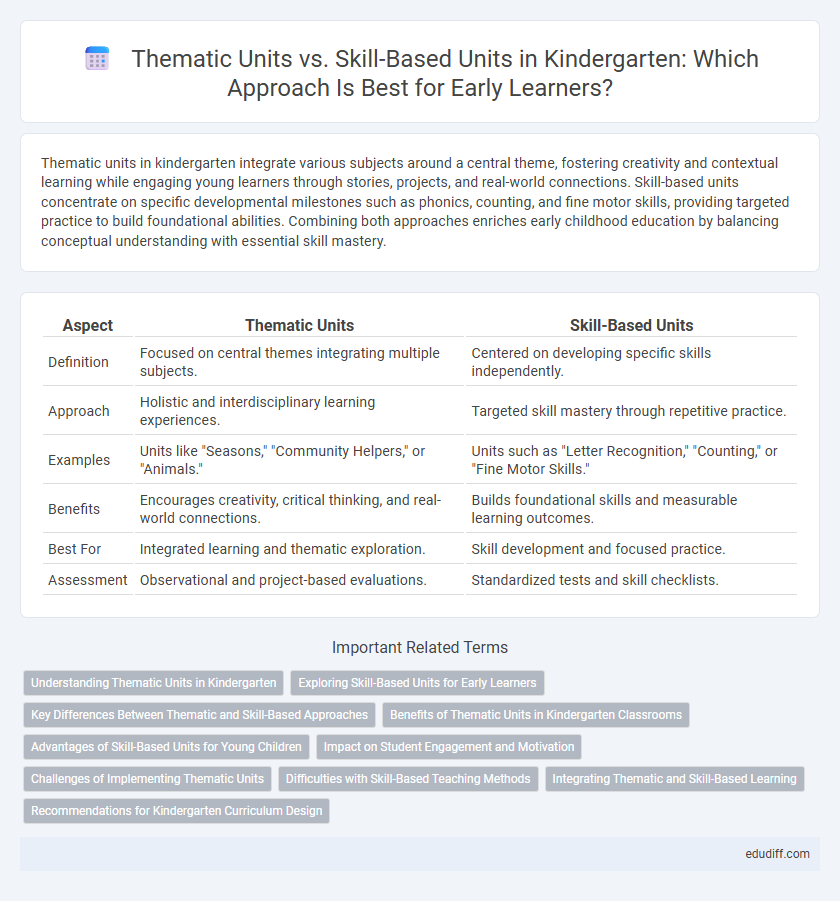Thematic units in kindergarten integrate various subjects around a central theme, fostering creativity and contextual learning while engaging young learners through stories, projects, and real-world connections. Skill-based units concentrate on specific developmental milestones such as phonics, counting, and fine motor skills, providing targeted practice to build foundational abilities. Combining both approaches enriches early childhood education by balancing conceptual understanding with essential skill mastery.
Table of Comparison
| Aspect | Thematic Units | Skill-Based Units |
|---|---|---|
| Definition | Focused on central themes integrating multiple subjects. | Centered on developing specific skills independently. |
| Approach | Holistic and interdisciplinary learning experiences. | Targeted skill mastery through repetitive practice. |
| Examples | Units like "Seasons," "Community Helpers," or "Animals." | Units such as "Letter Recognition," "Counting," or "Fine Motor Skills." |
| Benefits | Encourages creativity, critical thinking, and real-world connections. | Builds foundational skills and measurable learning outcomes. |
| Best For | Integrated learning and thematic exploration. | Skill development and focused practice. |
| Assessment | Observational and project-based evaluations. | Standardized tests and skill checklists. |
Understanding Thematic Units in Kindergarten
Thematic units in kindergarten integrate multiple subjects around a central theme, promoting holistic learning and deeper understanding by connecting concepts across language, science, math, and social studies. This approach encourages active engagement, critical thinking, and retention through hands-on activities, storytelling, and collaborative projects that relate to real-world experiences. Unlike skill-based units, thematic units foster comprehensive development and creativity by situating skills within meaningful contexts rather than isolated drills.
Exploring Skill-Based Units for Early Learners
Skill-based units in kindergarten focus on developing foundational abilities such as literacy, numeracy, and fine motor skills through targeted activities. These units emphasize practical application and repetition, enabling young learners to build competence in essential areas at their own pace. Exploring skill-based units supports early learners by fostering independence and confidence in core competencies crucial for academic success.
Key Differences Between Thematic and Skill-Based Approaches
Thematic units in kindergarten focus on integrating various subjects around a central theme, promoting holistic understanding and student engagement through real-world contexts. Skill-based units prioritize the development of specific abilities such as literacy, numeracy, or fine motor skills, often through targeted practice and repetition. Key differences include the thematic approach's emphasis on interdisciplinary connections versus the skill-based method's focus on mastery of individual competencies.
Benefits of Thematic Units in Kindergarten Classrooms
Thematic units in kindergarten classrooms integrate multiple subjects around a central theme, fostering deeper understanding and meaningful connections among concepts. This approach enhances student engagement, encourages creativity, and supports language development by providing context-rich learning experiences. Moreover, thematic units promote skill application in real-life scenarios, aiding holistic development and retention of knowledge.
Advantages of Skill-Based Units for Young Children
Skill-based units enhance early cognitive and motor development by targeting specific abilities such as fine motor skills, language acquisition, and social interaction. These units provide structured, repetitive practice that supports mastery through hands-on activities and focused lessons. Young children benefit from clear skill progression, which builds confidence and promotes measurable growth in foundational competencies.
Impact on Student Engagement and Motivation
Thematic units in kindergarten integrate multiple subjects around a central theme, fostering curiosity and enhancing student engagement through meaningful real-world connections. Skill-based units concentrate on mastering specific abilities, which can improve focused learning but may limit intrinsic motivation due to repetitive tasks. Balancing thematic relevance with targeted skill development maximizes motivation, encouraging active participation and deeper understanding in young learners.
Challenges of Implementing Thematic Units
Implementing thematic units in kindergarten presents challenges such as aligning diverse themes with curriculum standards and ensuring consistent skill development across subjects. Teachers must balance creative interdisciplinary content with age-appropriate skill acquisition, often requiring extensive planning and resource integration. Limited time and varied student readiness levels further complicate the effective execution of thematic units compared to more structured skill-based units.
Difficulties with Skill-Based Teaching Methods
Skill-based teaching methods in kindergarten often face challenges such as limited student engagement and lack of contextual learning, making it hard for young children to grasp abstract skills without concrete examples. Unlike thematic units that integrate multiple skills around familiar topics, skill-based units can cause fragmented learning experiences, reducing comprehension and retention. Teachers may struggle to adapt skill-based curricula to diverse learning paces and styles, leading to gaps in foundational development.
Integrating Thematic and Skill-Based Learning
Integrating thematic units with skill-based units in kindergarten enhances holistic learning by connecting meaningful content with essential developmental skills such as literacy, math, and social-emotional abilities. Thematic units, centered around engaging, real-world topics, provide context that enriches skill acquisition and retention, fostering deeper understanding and enthusiasm. Balancing both approaches promotes cognitive growth and adaptability, ensuring young learners develop interconnected knowledge and practical competencies.
Recommendations for Kindergarten Curriculum Design
Kindergarten curriculum design benefits from balancing thematic units and skill-based units to support holistic development. Thematic units enhance engagement and contextual learning by integrating subjects around meaningful topics, while skill-based units focus on targeted mastery of foundational skills such as literacy and numeracy. Combining both approaches ensures children develop critical thinking, creativity, and essential academic competencies in an age-appropriate, developmentally suitable manner.
Thematic units vs Skill-based units Infographic

 edudiff.com
edudiff.com